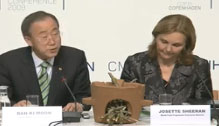Christa Roth, December, 2009
Good question, Tom: while we were with GTZ in Malawi, we did a lot of work on standardising the dimensions of locally produced fired portable clay stoves (model adopted from Practical Action's work in Kenya). Their selling price ranges from 1- 3 $ in the communities. We all agree that stove-wise, they are not the greatest devices, but the most affordable, accessible and convenient ones in this area. As people mostly don't have kitchens, portability ranges high on the priority list of peoples choices, so mudstoves are not an option here.
Thus we had to work with the available material to produce a stove that people wanted and could afford. With the help of simple moulds and measuring tools we worked towards a uniformity of this artisanal product and standardise the crucial points influencing stove
performance: size of the door, height of the fire-chamber, durability and shape of potrests to ensure a standard gap between stove body and pot., to name a few.
I never had a chance to get the stoves tested for emissions, but they do reduce fuel consumption as compared to the open fire, while the amount of reduction depends more on the user than the stove itself.
I can't quantify the change in performance achieved by these quality control measures, but they definitely led to a much better uniformity and acceptance of this artisanal product. A good-looking stove just sells better!
One of these clay stoves from Mulanje made it on Ban Ki Moons desk in Copenhagen last week, thanks to colleagues from WFP. So watch the video on http://www.wfp.org/stories/wfp-launches-safe-stoves-initiative
regards, ChristaNIKE AIR MAX

